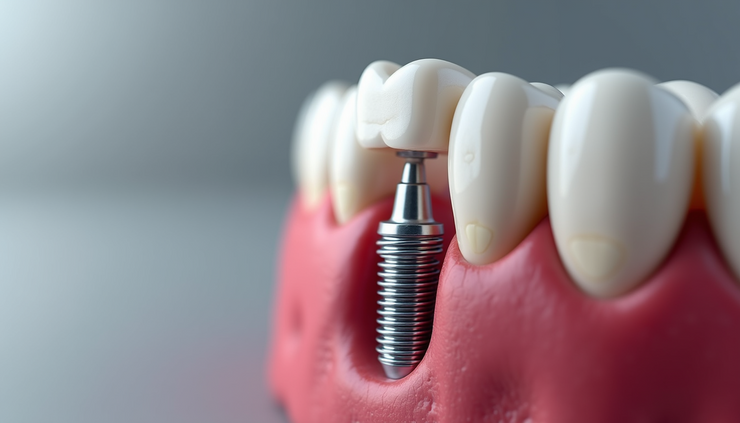Discover the Top Benefits of Choosing Dental Implants for Your Smile
- DJ Dental Group
- Nov 14, 2025
- 4 min read
Losing a tooth can affect more than just your appearance. It can impact your ability to eat, speak clearly, and even your confidence. Dental implants offer a reliable and long-lasting solution for tooth loss, restoring both function and aesthetics. This post explores the top benefits of dental implants and why they might be the best choice for your smile.

What Are Dental Implants?
Dental implants are small titanium posts surgically placed into the jawbone to act as artificial tooth roots. Once the implant fuses with the bone, a crown, bridge, or denture is attached to restore the missing tooth or teeth. Unlike dentures or bridges, implants provide a stable foundation that mimics natural teeth.
Benefit 1: Improved Appearance and Confidence
Dental implants look and feel like natural teeth. Because they fuse with the bone, they become permanent and prevent the sunken look that often happens with missing teeth. This natural appearance can boost your confidence, allowing you to smile, speak, and eat without worry.
People who choose implants often report feeling more comfortable in social situations. They don’t have to worry about slipping dentures or gaps in their smile. This improvement in self-esteem can positively affect personal and professional relationships.
Benefit 2: Better Oral Health
Unlike traditional bridges, dental implants do not require grinding down adjacent teeth. This preserves the health of your remaining natural teeth. Implants also help maintain jawbone density by stimulating the bone, preventing bone loss that usually occurs after tooth loss.
Maintaining bone structure is crucial for oral health. Without stimulation, the jawbone can shrink, leading to changes in facial shape and difficulties with chewing. Implants support the bone, keeping your face looking youthful and your mouth functioning well.
Benefit 3: Enhanced Comfort and Function
Dental implants eliminate the discomfort associated with removable dentures. Because implants are fixed in place, they feel more natural and stable. This stability allows you to eat a wider variety of foods without fear of slipping or pain.
Chewing efficiency with implants is close to that of natural teeth. This means you can enjoy crunchy vegetables, nuts, and other healthy foods that might be difficult with dentures. Improved chewing also aids digestion and overall nutrition.
Benefit 4: Durability and Longevity
With proper care, dental implants can last a lifetime. Unlike bridges or dentures that may need replacement every 5 to 15 years, implants offer a permanent solution. Their durability makes them a cost-effective choice over time despite the higher initial investment.
Regular dental check-ups and good oral hygiene are essential to maintain implants. Avoiding smoking and managing health conditions like diabetes can also improve implant success rates.
Benefit 5: Convenience and Easy Maintenance
Dental implants do not require special adhesives or soaking solutions like dentures. You care for them just like natural teeth—brushing twice a day, flossing, and visiting your dentist regularly. This simplicity makes implants a convenient option for busy lifestyles.
Because implants are fixed, you don’t have to remove them for cleaning or worry about losing them. This ease of maintenance contributes to better oral hygiene and fewer dental problems.
Benefit 6: Speech Improvement
Missing teeth or ill-fitting dentures can cause speech problems such as slurring or mumbling. Dental implants restore your ability to speak clearly by providing stable teeth that do not shift or move. This can improve communication and reduce embarrassment in social or professional settings.
Benefit 7: Preservation of Facial Structure
When teeth are missing, the jawbone can deteriorate, leading to a sunken or aged appearance. Dental implants stimulate the bone, preventing this bone loss and preserving your natural facial contours. This helps maintain a youthful look and prevents changes in your bite or jaw alignment.
Who Is a Good Candidate for Dental Implants?
Most healthy adults who have sufficient jawbone density can consider dental implants. Your dentist will evaluate your oral health, bone structure, and medical history to determine if implants are suitable for you. In some cases, bone grafting or other procedures may be needed to prepare the site.
People with uncontrolled diabetes, heavy smokers, or those undergoing radiation therapy in the jaw area may face higher risks of implant failure. Discuss your full medical history with your dental professional to make an informed decision.
What to Expect During the Dental Implant Process
The implant process typically involves several steps over a few months:
Consultation and planning: Your dentist examines your mouth and takes X-rays or 3D scans.
Implant placement: The titanium post is surgically inserted into the jawbone.
Healing period: The implant fuses with the bone, a process called osseointegration, which can take 3 to 6 months.
Abutment placement: A connector piece is attached to the implant.
Crown placement: A custom-made crown is fixed to the abutment, completing the restoration.
While the process takes time, the result is a strong, natural-looking tooth replacement.
Cost Considerations and Insurance
Dental implants usually cost more upfront than other tooth replacement options. Prices vary depending on the number of implants, location, and additional procedures needed. Many dental insurance plans cover part of the cost, but coverage varies widely.
Think of implants as a long-term investment in your oral health and quality of life. Over time, their durability and benefits often outweigh the initial expense.





Comments